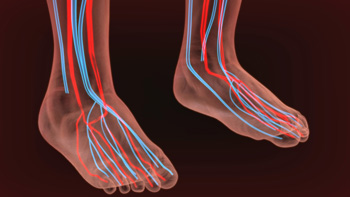
The circulatory system in the body is rarely thought about when it is working properly. Problems may occur when blood flow is restricted, and can cause reduced mobility, in addition to increasing the risk of a heart attack. A common cause of poor circulation is peripheral artery disease (PAD). One of the first signs of this condition can be pain in the feet and legs while walking, and this may be diminished by stretching and exercising at least three times per week. It is suggested to patients who smoke to stop or cut back, and people who are diabetic to control their sugar intake. A sign of poor circulation can include a wound on the foot that doesn't heal. Many people are unaware they may have cuts and scrapes on their feet as a result of the inability to feel sensations. Patients who are short of breath may be experiencing poor circulation, and this may be a subtle sign of a heart issue. If you have any of these symptoms, it is strongly suggested that you are under the care of a podiatrist who can offer you correct treatment options.
While poor circulation itself isn’t a condition; it is a symptom of another underlying health condition you may have. If you have any concerns with poor circulation in your feet contact Howard Kimmel, DPM of Buckeye Foot Care. Our doctor will treat your foot and ankle needs.
Poor Circulation in the Feet
Peripheral artery disease (PAD) can potentially lead to poor circulation in the lower extremities. PAD is a condition that causes the blood vessels and arteries to narrow. In a linked condition called atherosclerosis, the arteries stiffen up due to a buildup of plaque in the arteries and blood vessels. These two conditions can cause a decrease in the amount of blood that flows to your extremities, therefore resulting in pain.
Symptoms
Some of the most common symptoms of poor circulation are:
- Numbness
- Tingling
- Throbbing or stinging pain in limbs
- Pain
- Muscle Cramps
Treatment for poor circulation often depends on the underlying condition that causes it. Methods for treatment may include insulin for diabetes, special exercise programs, surgery for varicose veins, or compression socks for swollen legs.
As always, see a podiatrist as he or she will assist in finding a regimen that suits you. A podiatrist can also prescribe you any needed medication.
If you have any questions, please feel free to contact one of our offices located in Brook Park and Willoughby, OH . We offer the newest diagnostic and treatment technologies for all your foot care needs.
